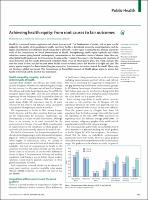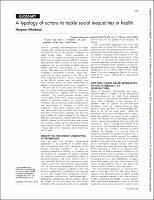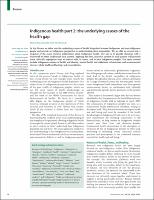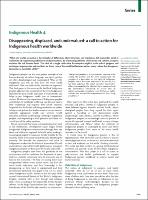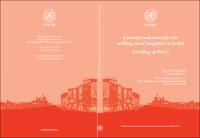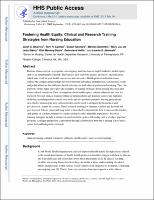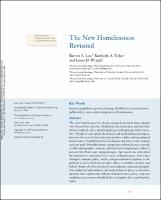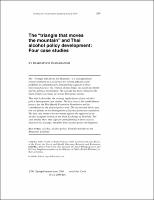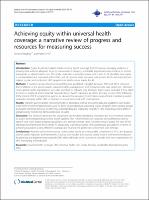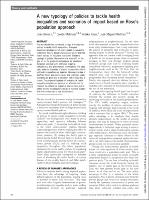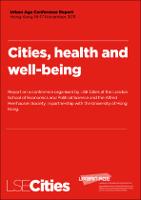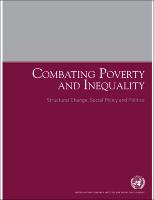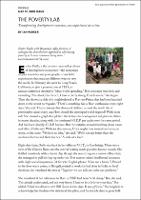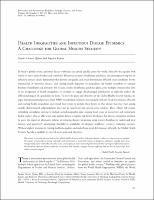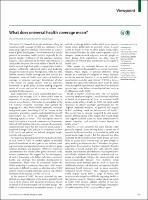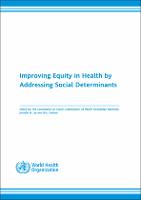Browsing 1.02.02 Health in All Policies by Submit Date
Now showing items 1-20 of 51
-
Achieving health equity: from root causes to fair outcomes
(The Lancet, 2007) -
A typology of actions to tackle social inequalities in health
(Journal of Epidemiology & Community Health, 2007) -
Indigenous health part 2: the underlying causes of the health gap
(The Lancet, 2009) -
Fostering Health Equity: Clinical and Research Training Strategies from Nursing Education
(The Kaohsiung Journal of Medical Sciences, 2009)
Racism, ethnocentrism, segregation, stereotyping, and classism are tightly linked to health equity and social determinants of health. They lead to lack of power, money, resources, and education which may result in poor health care access and outcomes. Health profession faculties must address the complex relationships that exist between individual, interpersonal, institutional, social and political factors that influence health outcomes in both clinical and research training. Thus, the purposes of this paper are to provide examples of training ... -
Deconstructing development discourse: buzzwords and fuzzwords
(Practical Action Pub. ; Oxfam, 2010)
"Writing from diverse locations, contributors critically examine some of the key terms in current development discourse. Why should language matter to those who are doing development? Surely, there are more urgent things to do than sit around mulling over semantics? But language does matter. Whether emptied of their original meaning, essentially vacuous, or hotly contested, the language of development not only shapes our imagined worlds, but also justifies interventions in real people's lives. If development buzzwords conceal ideological differences ... -
The New Homelessness Revisited
(Annual Review of Sociology, 2010)
The new homelessness has drawn sustained attention from scholars over the past three decades. Definitional inconsistencies and data limitations rendered early work during this period largely speculative in nature. Thanks to conceptual, theoretical, and methodological progress, however, the research literature now provides a fuller understanding of homelessness. Contributions by sociologists and other social scientists since the mid-1990s differentiate among types of homelessness, provide credible demographic estimates, and show how being homeless ... -
The “Triangle That Moves the Mountain” and Thai Alcohol Policy Development: Four Case Studies
(Contemporary Drug Problems, 2009)
The “Triangle that Moves the Mountain” is a conceptualized strategy initiated as a social tool for solving difficult social problems, by simultaneously strengthening capacity in three interrelated sectors: (1) creation of knowledge; (2) social movement; and (3) political involvement. The concept has been claimed as the basis of many successes in various Thai policy arenas. This article describes the strategy implications of four alcohol policy development case studies. The first case is the establishment process for the Thai Health Promotion ... -
Conceptions of Social Enterprise and Social Entrepreneurship in Europe and the United States: Convergences and Divergences
(Journal of Social Entrepreneurship, 2010)
The concepts of social enterprise and social entrepreneurship are making amazing breakthroughs in EU countries and the United States. Until recently, the debates on both sides of the Atlantic have taken place in parallel trajectories with few connections among them. In the first part of the paper, we describe the European and US historical landscapes in which those concepts took root. In the second part, we analyse how the various conceptualizations have evolved. This analysis paves the way for the third part, in which we highlight the conceptual ... -
Closing the health equity gap: policy options and opportunities for action
(World Health Organization, 2013)
This report, which highlights policy options for consideration within national discussions, was developed in conjunction with WHO regional offices and others across the Organization who are working on the social determinants of health and equity issues. The general approach to the report was discussed at a seminar within WHO’s Information, Evidence and Policy cluster and with WHO regional advisors following the release of the final report of the Commission on Social Determinants of Health in August 2008. In January 2009 the 124th session of the ... -
A Practitioner’s Guide for Advancing Health Equity: Community Strategies for Preventing Chronic Disease
(2013)
The intention of A practitioner’s guide for advancing health equity is to help practitioners and leaders incorporate a health equity view in their collaborations with community organizations. It offers ideas — with stories to illustrate — for how public health organizations can develop competency in the important work of building organizational capacity, engaging communities, developing partnerships and coalitions, and making the case for health equity. Each of the four sections of the Practitioner’s guide (1. foundational skills, 2. tobacco-free ... -
Achieving equity within universal health coverage: a narrative review of progress and resources for measuring success
(2014)
Introduction: Equity should be implicit within universal health coverage (UHC) however, emerging evidence is showing that without adequate focus on measurement of equity, vulnerable populations may continue to receive inadequate or inferior health care. This study undertakes a narrative review which aims to: (i) elucidate how equity is contextualised and measured within UHC, and (ii) describe tools, resources and lessons which will assist decision makers to plan and implement UHC programmes which ensure equity for all. Methods: A narrative review ... -
A new typology of policies to tackle health inequalities and scenarios of impact based on Rose's population approach
(Journal of Epidemiology and Community Health, 2013)
The last decade has witnessed a surge in interest for policies to tackle health inequalities. Adequate theoretical development of policy models is needed to understand how to design and evaluate equity-oriented health policies. In this paper we review Graham’s typology of policies (focused on the worst-off, on the gap, or on the gradient) and propose an adaptation (targeted, universal with additional targeting, redistributive, and proportionate universalism). For each type, potential scenarios of impact on population health and health inequalities ... -
Cities, health and well-being
(2012)
Cities are critical sites for enquiry and action in relation to health and well-being. With up to 70 per cent of the world’s population estimated to be living in urban areas by 2050, global health will be determined increasingly in cities. In response to these challenges, the 2011 Urban Age Hong Kong conference, organized by the London School of Economics and Political Science and the Alfred Herrhausen Society in partnership with the University of Hong Kong, brought together over 170 planners, architects, sociologists, medical doctors, public ... -
Combating poverty and inequality: structural change, social policy and politics
(United Nations Research Institute for Social Development, 2010)
Poverty reduction is a central feature of the international development agenda and contemporary poverty reduction strategies increasingly focus on “targeting the poor”, yet poverty and inequality remain intractable foes. Combating Poverty and Inequality argues that this is because many current approaches to reducing poverty and inequality fail to consider key institutional, policy and political dimensions that may be both causes of poverty and inequality, and obstacles to their reduction. Moreover, when a substantial proportion of a country’s ... -
Health Inequalities and Infectious Disease Epidemics: A Challenge for Global Health Security
(2014)
In today's global society, infectious disease outbreaks can spread quickly across the world, fueled by the rapidity with which we travel across borders and continents. Historical accounts of influenza pandemics and contemporary reports on infectious diseases clearly demonstrate that poverty, inequality, and social determinants of health create conditions for the transmission of infectious diseases, and existing health disparities or inequalities can further contribute to unequal burdens of morbidity and mortality. Yet, to date, studies of influenza ... -
What does universal health coverage mean?
(The Lancet, 2014) -
Improving equity in health by addressing social determinants
(World Health Organization, 2011)
This recently published book highlights actions to improve health equity based on findings from the nine global Knowledge Networks that were established during the WHO Commission on Social Determinants of Health. Their task was to synthesize existing evidence and identify effective and appropriate actions to improve health equity in nine thematic areas: - globalization; - gender; - social exclusion; - early child development; - urban settings; - employment conditions; - health systems; - public health programs; and - measurement and evidence. ...

